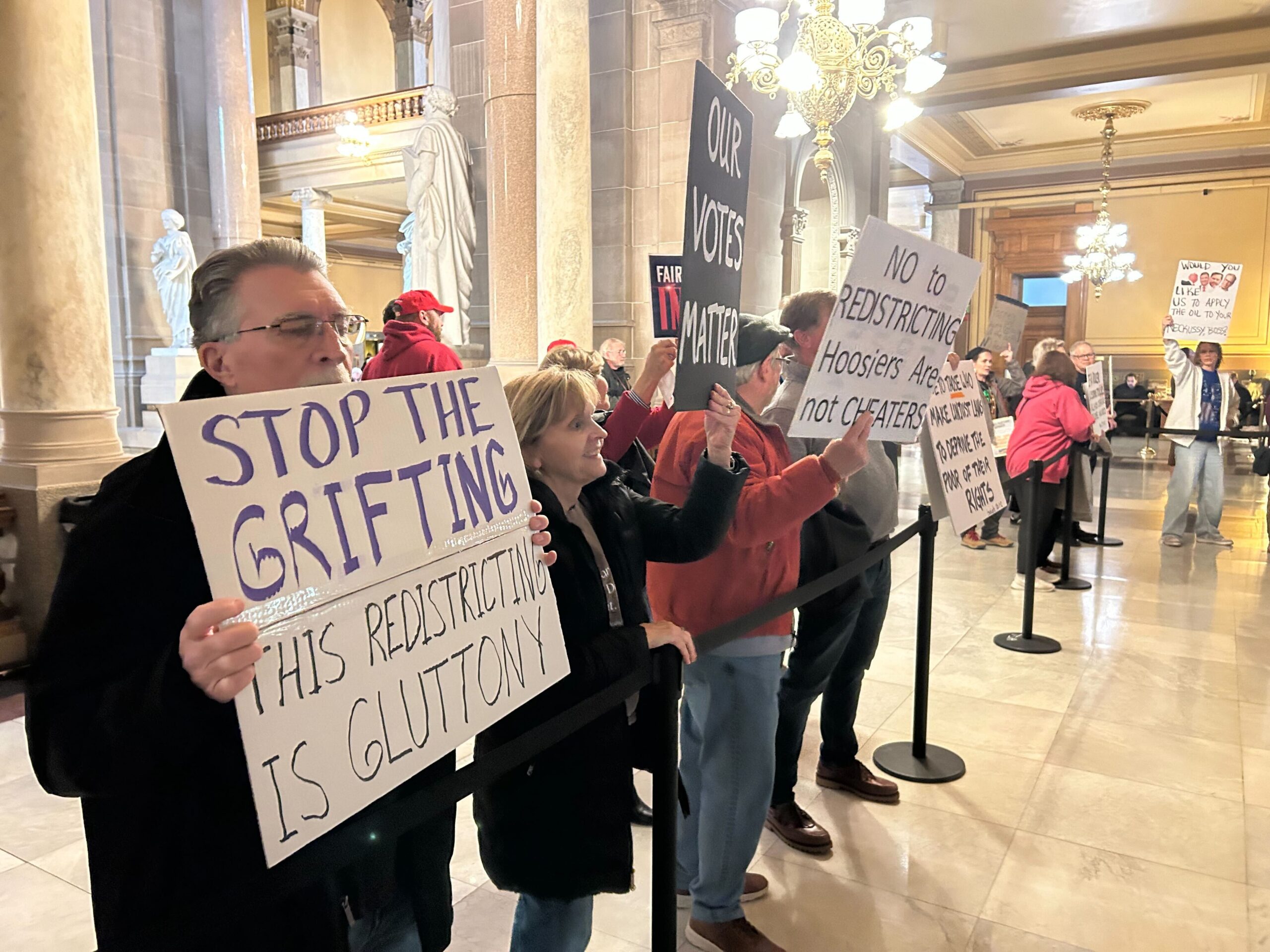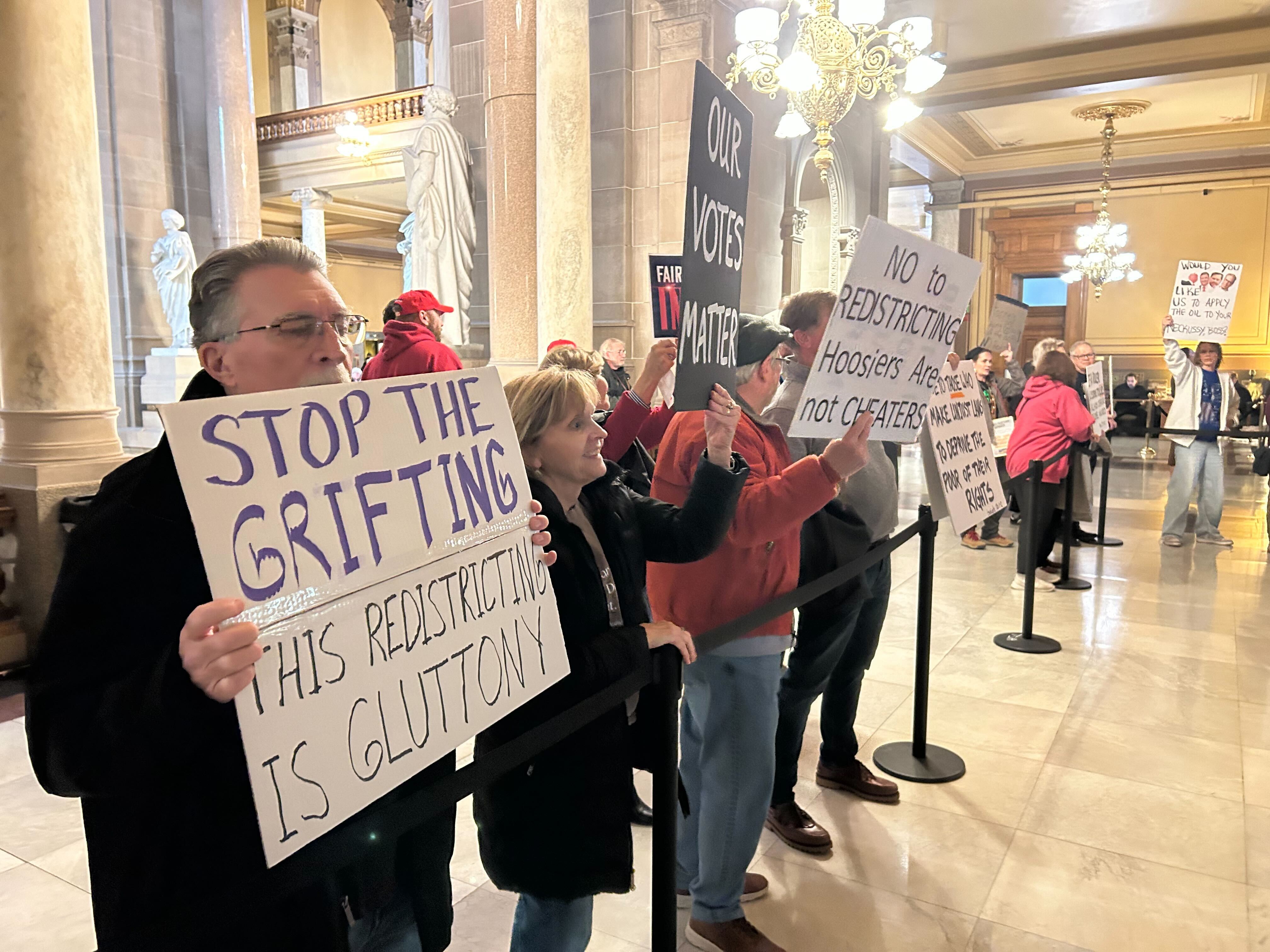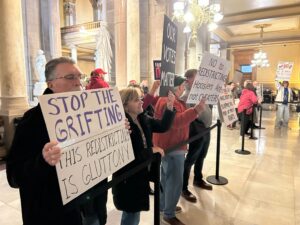Congress
Ted Cruz, Senate panel mulls permanent daylight saving time
Senators are wading into the thorny issue of whether to “lock the clock” — that is, end the practice of changing the time twice a year to account for the shifting seasons.
At a hearing Thursday, Senate Commerce Chair Ted Cruz said there was general consensus among his colleagues that Americans should stop changing the clocks by adopting permanent daylight savings time — which makes it light later in the evening and later in the morning — or permanent standard time, which does the opposite. But there isn’t agreement on which standard to embrace.
The Senate unanimously passed legislation in 2022 from Sen. Rick Scott (R-Fla.) to create permanent daylight savings time without requiring states already on permanent standard time to make the move. The bill’s passage at that time took many lawmakers by surprise, including those who said they would have hurried to the floor to block the request for speedy consideration had they known the measure was coming up for a vote. It later died in the House.
Scott said Thursday that President Donald Trump is “on board to lock the clock.” In December, Trump expressed support for ending the practice of changing time twice a year, but in March said it’s a “50/50 issue.”
He explained in remarks in the Oval Office, “If something is a 50/50 issue, it’s hard to get excited about it. I assume people would like to have more light later, but some people want to have more light earlier because they don’t want to take their kids to school in the dark.”
A White House spokesperson declined to clarify Trump’s stance further.
But Commerce Committee members also said they wanted to make sure states have latitude to make their own decisions on whether to use permanent daylight or standard time, weighing economic and health tradeoffs.
“There are very real and complicated issues and counterveiling arguments on both sides,” Cruz said. “There is widespread agreement on locking the clock … but the reason we’re holding these hearings is because these are real arguments and they have real impacts on people.”
Lawmakers heard Thursday from advocates on both sides of the issue, including the CEO of the National Golf Course Owner’s Association favoring permanent daylight savings time and a sleep medicine expert backing permanent standard time. Jay Karen, the CEO of the golf association, said that late afternoon golf activities account for a high share of revenue and that permanent daylight savings time would be a boon for outdoor recreation generally, leading to health benefits.
Karin Johnson, the sleep medicine doctor and member of the American Academy of Sleep Medicine’s advocacy committee, said permanent daylight savings time would be a “hidden mandate” that would wake Americans earlier and disrupt their circadian rhythms. She also pointed out that previous attempts to make this switch were abandoned. Permanent standard time would also lead to lower rates of depression and better sleep, she argued.
Cruz didn’t take a clear stance on whether he sided with permanent daylight savings time or standard time, but he argued that changing the clocks twice a year can indeed disrupt sleep.
“This leads to increased risks of health problems, including higher rates of heart attacks, strokes, and even car accidents immediately following the time change,” Cruz said.
Sen. Lisa Blunt Rochester (D-Del.) said it’s important lawmakers be “thoughtful” about how time changes work state-by-state.
“What works in my home state of Delaware may not work in Washington state,” Blunt Rochester said. “It’s time to figure this out. People across our country are tired of the constant cycle of falling back and springing forward.”
Congress
The national make-or-break issue of the year’: Redistricting fight gets reset after Trump’s Supreme Court win

INDIANAPOLIS — Republicans scored a major win in the redistricting fight when the Supreme Court reinstated Texas’ newly drawn congressional map on Thursday. But President Donald Trump and his allies are staring down a brewing rebellion in the Indiana Statehouse that could derail their momentum.
The high court decided in an apparent 6-3 vote to block a lower court ruling that deemed the Texas map a likely illegal race-based gerrymander. In doing so, the court’s conservative majority helped Republicans avert a nightmare scenario in which Trump’s redistricting push ultimately cost the party seats leading into the 2026 midterms.
The focus now shifts to Indianapolis, where the president’s allies are heaping pressure on GOP holdouts in the state Senate who are resisting Trump’s demands to draw new lines there that could net Republicans additional congressional seats.
In the state Capitol, as members of the state House debated final passage of a map supporters argue would all but guarantee an entirely Republican congressional delegation — from the current 7-2 split favoring the GOP — Turning Point USA held a sparsely attended rally to pressure Indiana Senate Republicans to do the same, over chants of “9-0.”
“This is now the national make-or-break issue of the year,” said Brett Galaszewski of Turning Point Action, adding that Indiana “is the center of the political universe.” Gov. Mike Braun and Lt. Gov. Micah Beckwith both addressed the crowd as they faced cheers, boos and shouts of “cheaters” from counterprotesters.
Earlier Friday, Turning Point Action announced that it, along with Trump-aligned super PACs, would spend in excess of eight figures to primary Indiana Republicans through 2028 if they opposed the new map. And Club for Growth President David McIntosh issued a “FINAL WARNING” to Indiana Senate President Pro Tem Rodric Bray, writing, “failure to get this done means you and any other opposition will be defeated and removed from office in your next election.”
All of it was designed to amp up pressure on reluctant Indiana Senate Republicans, who are expected to convene Monday to consider the new map. It’s unclear whether pro-redistricting allies have flipped any senators since they stalemated 19-19last month on a vote that was a close proxy for gerrymandering. The map passed the state House easily on Friday.

For now, Republicans have an edge across the six states that have seen a redraw. The GOP has nine more favorable seats across four states — Texas, Ohio, Missouri and North Carolina — while Democrats have five more blue-leaning seats in California, and an additional court-ordered likely pickup in Utah.
The fight over the new lines across the country is expected to carry into the new year. Privately, Democrats were not shocked by the Texas ruling, long assuming the conservative Supreme Court was going to allow the Texas map to stand. With the Texas maps in place, Democrats involved in the nationwide battle anticipate they’ll ultimately start the midterm cycle down a handful of seats, but the exact number isn’t clear.
Republicans see another key pickup opportunity in Florida, where party redistricting proponents think they could extract another three to five seats ahead of the midterm elections.
But while the state Legislature officially kicked off the mid-decade battle in the state on Thursday, Gov. Ron DeSantis and the Florida House lawmaker in charge of redistricting are at odds over how quickly to do it. And the state’s prospective redraw faces another roadblock: Florida’s anti-gerrymandering standards, which hold that a new district cannot be drawn for partisan gain.
Democrats, meanwhile, are homing in on Virginia. Five of the state’s 11 House seats are held by Republicans, who were trounced in a November election that bestowed on Virginia a Democratic governor, attorney general and a big Statehouse majority. Democrats there already kicked off a surprise redraw process right before the election. Now, Virginia House of Delegates Speaker Don Scott is teasing a major redraw early next year.
“10-1 is not out of the realm to be able to draw the maps in a succinct and community-based way,” he said this week. “We’re gonna take a look at it. We have to.”
In Missouri, Democrats are looking to challenge a map the GOP-controlled Legislature passed in September, leaving the state with just one blue district. They face a Thursday deadline to submit over 100,000 signatures that could trigger a referendum and temporarily block the new lines from being implemented, along with a complicated web of legal battles around the referendum process.
The Department of Justice, meanwhile, is going ahead with its lawsuit to challenge California’s new congressional map, even after Attorney General Pam Bondi celebrated the Supreme Court’s decision to greenlight Texas’ newly gerrymandered House map.
But the high court’s blessing of Texas’ Republican-friendly redrawn map came with a few Easter eggs that suggested how some of the other percolating redistricting battles are likely to play out. Most notably, three of the court’s conservative justices — Samuel Alito, Clarence Thomas and Neil Gorsuch — concluded that California’s redrawn districts were “indisputably” crafted for partisan advantage.
It’s unclear precisely how the justices’ decision will influence the broader national clash over mid-decade redistricting for 2026. Had the justices struck down Texas’ map, it may have increased pressure on other GOP-led states like Indiana and Florida to redraw their own boundaries to help give the party a better chance at retaining the House. On the other hand, the ruling’s clear blessing of mid-decade redistricting for partisan gain could ensure that it becomes a routine weapon in the arsenal of political warfare.
But conservative justices’ signaling on California’s map bodes poorly for the Trump administration, with the DOJ and California Gov. Gavin Newsom trading barbs following the decision.
“So you gonna drop your lawsuit against us right, Pam?” Newsom’s office asked on X Thursday night.
“Not a chance, Gavin — we will stop your DEI districts for 2026,” the Justice Department wrote back.
Adam Wren reported from Indianapolis, and Gregory Svirnovskiy and Kyle Cheney reported from Washington. Andrew Howard contributed to this report.
Congress
Mike Johnson scrambles to pass Pentagon bill as GOP ranks seethe
House Republicans spent this week venting about Mike Johnson, questioning the speaker’s hold on his tenuous House majority. Next week, he has to prove he’s capable of governing.
The annual Pentagon policy bill is due on the floor just in time to test Johnson’s ability to command and cajole his conference with must-pass legislation at stake. Already GOP leaders have had to delay release of bill text as they deal with a host of 11th-hour intraparty flare-ups that show just how hard it will be for the speaker to lead ahead of next year’s midterm elections.
Johnson is already bruised from a high-profile fight with Rep. Elise Stefanik (R-N.Y.), a member of the GOP leadership team, over a surveillance provision she wanted attached to the sprawling defense package. She got her way after publicly accusing the speaker of lying and sandbagging conservatives.
Other deeply divisive issues remain, ranging from cryptocurrency policy to in vitro fertilization, that could threaten to further splinter the House GOP and imperil the typically bipartisan Pentagon bill. The brouhaha threatens to complicate Johnson’s effort to hammer out a still-brewing Republican health care plan he’s promised to unveil by early next week.
“I think there’s a lot of members that are frustrated that we’re not doing the things that we said that we were going to do,” said Rep. Greg Steube (R-Fla.) when asked about Johnson’s leadership. “His response to that would be, we only have a [three] vote majority, but I think if you govern conservatively, Republicans will show up and vote for it.”
Steube, a member of the House Intelligence Committee, said he was “not happy” that Johnson initially excluded Stefanik’s legislation allowing for congressional notification of counterintelligence probes concerning candidates for federal office — part of an annual intelligence authorization legislation that, he said, included “a lot of conservative reforms.” The speaker argued he didn’t know about the measure and that Stefanik’s accusations were “false.”
Top GOP leaders are scrambling to douse the remaining fires and release text of the massive bill as early as Saturday, but it could slip into Sunday, according to four people granted anonymity to comment on internal planning. The negotiations are complicated, they say, because the final product must not only pass the GOP-controlled House but also withstand a possible Senate filibuster — meaning it needs to have Democratic buy-in.
“Getting an agreement right now between Republicans and Democrats in the House and Senate’s not easy,” Majority Leader Steve Scalise said. “But we’re getting close, and we want to get it done.”
Johnson played down the internal turmoil Thursday, saying Republicans “are exactly on the trajectory of where we’ve always planned to be.”
“Steady at the wheel, everybody,” he said. “It’s going to be fine.”
But the pending fights over the Pentagon bill — or the National Defense Authorization Act, as it is formally known — serve as a mini-preview for the turmoil Johnson is likely to face for the remainder of the 119th Congress as he tries to tackle health care, government funding and other flashpoints.
For instance, he is risking a showdown with conservative hard-liners if the final package doesn’t include a provision they favor that would ban the Federal Reserve from issuing a digital currency. Johnson promised House Freedom Caucus members he would include the provision in the defense bill amid a toxic intra-GOP row during the House’s shambolic “crypto week” this summer.
If the so-called central bank digital currency ban is missing, “it is a big deal,” said one House conservative who, like others quoted for this story, was granted anonymity to speak frankly about conference dynamics.
The fate of that provision is currently tied up in talks over another matter — one that highlights how Johnson is facing pressure from another influential corner of the House GOP: his committee chairs.
GOP leaders are taking steps to add a scaled-down version of a Senate housing proposal to the package. But Financial Services Chair French Hill (R-Ark.) opposes the move and wants to advance a slate of House housing bills through his committee later this month.
Johnson and Hill, normally low-key operators, had an intense conversation on the House floor Wednesday night as House and Senate GOP leaders went back-and-forth, including at the White House’s behest, over how to add some housing affordability measures to the defense bill.
“French is very logical and measured, but he’s very stern in what he believes and what he wants,” said a senior House Republican.
Johnson, a staunch social conservative, is also facing pressure from women and others in the House to add a measure expanding coverage for in vitro fertilization and other fertility services for military families under DOD’s Tricare health system. He’s also caught between big business and China hawks — two major GOP blocs — on whether to add in new restrictions on U.S. investments in China. Rep. John Moolenaar (R-Mich.), who chairs a select committee on China, said he was hopeful the provision would make it in but pointed to opposition from the “financial community.”
The NDAA is “a train that comes around once a year,” he added. “We’re hoping to include it.”
Congress
Trump endorses identical twin of retiring Rep. Troy Nehls to fill his seat
President Donald Trump on Thursday endorsed Trever Nehls, the identical twin of retiring GOP Rep. Troy Nehls, to fill the Texas seat being vacated by his brother.
In a post on Truth Social, Trump lauded Troy Nehls for his congressional career, which he spent as a reliable MAGA ally, and praised his brother for his support of the military, veterans and “LAW AND ORDER,” commending their entire family as “fierce advocates” for the MAGA movement.
“In Congress, Trever will work hard to Keep our now very Secure Border, SECURE, Stop Migrant Crime, Grow our Economy, Cut Taxes and Regulations, Promote MADE IN THE U.S.A., Advance American Energy DOMINANCE, Champion Election Integrity, and Defend our always under siege Second Amendment,” he wrote in the post.
The retiring Nehls has demonstrated staunch loyalty to the president throughout his time in Congress, and the endorsement adds early momentum to his brother’s bid for the seat.
The lawmaker announced last week that he’d be retiring from Congress at the end of his third term representing a southwestern swath of Houston. The departure dealt yet another blow to Texas’ GOP congressional delegation after five other members announced their retirements. Republicans are banking on the state’s redistricting plan to shore up their majority with another five red seats.
Shortly after Troy Nehls announced his retirement, his brother announced on social media that he’d be stepping up to the plate to succeed him.
“District 22 needs a Representative who will follow in Troy’s footsteps and stand shoulder-to-shoulder with President Trump to defend our conservative values, secure the border, protect our families, and oppose the reckless and radical agenda that Democrats continue to press upon the American people,” he wrote. “I’m ready to take up that fight.”
This isn’t the first time he has followed in his brother’s footsteps. Trever Nehls also succeeded his twin as constable of Fort Bend County in 2013. He later won the Republican nomination to succeed him as the county’s sheriff in 2020 but later lost by 5 points in the general election.
-
Uncategorized1 year ago
Bob Good to step down as Freedom Caucus chair this week
-

 Politics10 months ago
Politics10 months agoFormer ‘Squad’ members launching ‘Bowman and Bush’ YouTube show
-

 The Dictatorship10 months ago
The Dictatorship10 months agoPete Hegseth’s tenure at the Pentagon goes from bad to worse
-

 Politics10 months ago
Politics10 months agoBlue Light News’s Editorial Director Ryan Hutchins speaks at Blue Light News’s 2025 Governors Summit
-

 The Dictatorship10 months ago
The Dictatorship10 months agoLuigi Mangione acknowledges public support in first official statement since arrest
-

 The Josh Fourrier Show1 year ago
The Josh Fourrier Show1 year agoDOOMSDAY: Trump won, now what?
-

 Politics8 months ago
Politics8 months agoDemocrat challenging Joni Ernst: I want to ‘tear down’ party, ‘build it back up’
-

 Politics10 months ago
Politics10 months agoFormer Kentucky AG Daniel Cameron launches Senate bid





